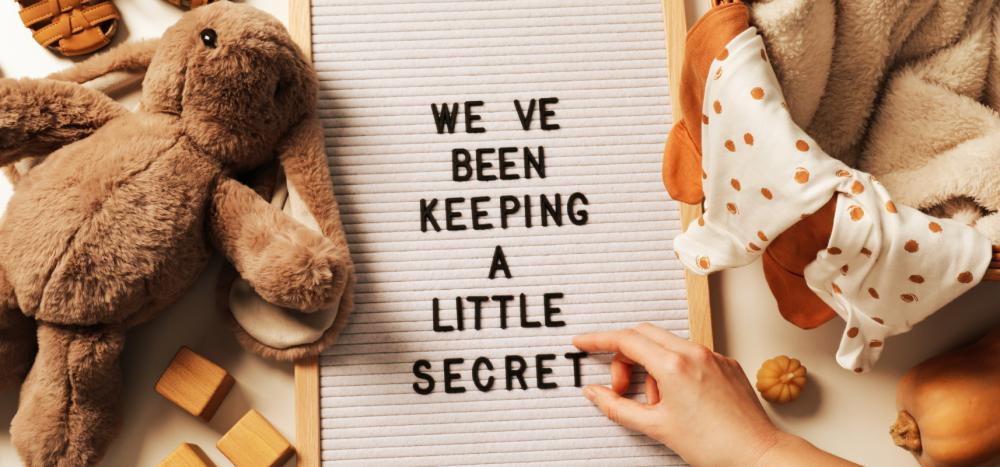Hey mama! Thinking about getting some new ink while you're expecting the arrival of your little one? We know pregnancy brings lots of changes and decisions, and body art might be on your mind.
Whether you're dreaming of commemorating your pregnancy journey with a meaningful tattoo or you had an appointment scheduled before finding out you're expecting, let's talk about what you need to know about getting tattoos while pregnant.
Understanding the Risks of Getting Tattoos While Pregnant
When it comes to getting tattooed during pregnancy, most medical professionals recommend waiting until after your baby arrives. If you’re a mama who’s looking forward to getting some ink to celebrate her pregnancy, we understand this might not be the news you’re looking for. While there’s no ironclad rule against it per se, there are very good reasons why medical professionals advise against getting tattoos while pregnant.
Here are some of the top concerns:
The Question of Tattoo Ink Safety
It’s important to understand that there's very limited research on how tattoo ink affects developing babies. Why does this matter? Remember that tattoos deeply pierce your skin and apply tattoo pigments to the dermis layer of your skin. Your dermis contains sweat glands, nerve endings, and blood vessels—one key reason why getting a tattoo isn’t what most would call a “pain-free experience!”
Some inks contain metal-based pigments and other chemicals, and there’s potential for these elements to enter your bloodstream while you are being tattooed and during the healing phase post-tattoo.
This is why, again, without comprehensive studies on tattoo ink safety during pregnancy, most doctors recommend erring on the side of caution and avoiding getting tattoos while pregnant.
Increased Infection Risk
During pregnancy, your immune system naturally shifts to protect your growing baby. While this is great for your little one, it also means your body might not fight off infections as effectively as usual. Since the process of applying a tattoo (of any size!) creates thousands of small ink deposits into the dermis layer of your skin—in other words: lots of tiny wounds—it presents an infection risk pregnant mamas don’t need to take.
Bloodborne Disease Concerns
Even in the cleanest, most professional tattoo studios, there's always an increased risk of exposure to bloodborne illnesses like hepatitis B and HPV. While this risk is typically low when you choose a reputable tattoo artist from a highly rated tattoo parlor, the potential consequences for your baby make it worth serious consideration.
Professional Medical Guidance


Most healthcare providers and professional tattoo artists take a clear stance on getting tattoos while pregnant: It's best to wait. While this may feel a bit limiting, that isn’t what this is about—it's about protecting you and your baby from unnecessary risks.
In fact, many licensed tattoo artists actually have clear policies against tattooing pregnant women. For one thing, the artist (and studio) has to consider their liability, but it goes beyond that. Refusing to tattoo pregnant people reflects a professional commitment to client safety and industry best practices.
Remember, you can always get a tattoo later! There's no reason to risk serious infections, your lowered immune system, and your baby's health. That said, if you're considering getting a tattoo while pregnant, your first step should be discussing it with your doctor so you can understand the potential risks for you and your pregnancy. As with so many decisions expecting mamas need to consider during pregnancy, your doctor can evaluate your specific situation and provide personalized guidance based on your health history.
Body Changes and Existing Tattoo Considerations
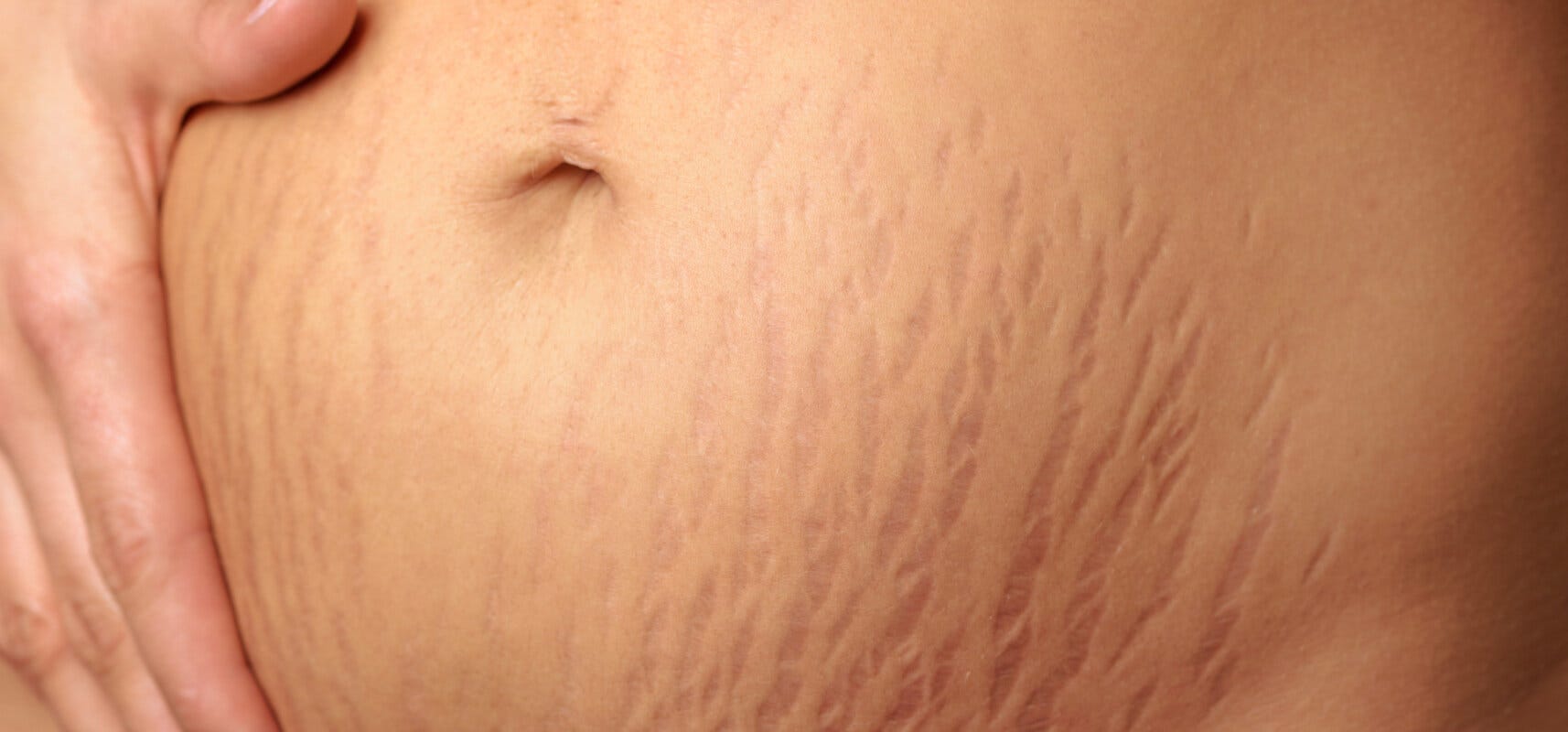

Pregnancy transforms your body in amazing ways, but these changes can significantly impact body art—both new and existing. Here's what you need to know:
Changes to Existing Tattoos
Your skin changes and stretches during pregnancy, particularly around your belly, breasts, and hips. This stretching can affect tattoos in these areas, potentially causing:
-
Distortion of the design
-
Color changes or fading
-
Stretch marks through the tattoo
But remember—these changes to your tattoos tell the beautiful story of bringing your little one into the world. Many moms view their transformed tattoos as badges of honor, marking their journey into motherhood. Plus, there’s always the opportunity for a touch-up on your design down the road.
Skin Sensitivity
What if you got a tattoo before you knew you were pregnant? It happens! That’s why it’s good to know that pregnancy hormones can make your skin more sensitive than usual. This might mean:
-
Slower healing time
-
Higher risk of skin reactions
-
More intense itching during the healing process
If you have any questions or concerns, don’t hesitate to reach out to your healthcare provider. Some questions you might want to consider in this scenario are:
-
Your specific risk factors based on medical history
-
Potential complications with your particular pregnancy
-
Post-tattoo care recommendations
-
Signs of complications to watch for
Alternative Options
Instead of getting a permanent tattoo during pregnancy, consider these temporary alternatives! They’re a great way to try out a design before committing, and they’re generally safe for pregnancy:
Henna Tattoos
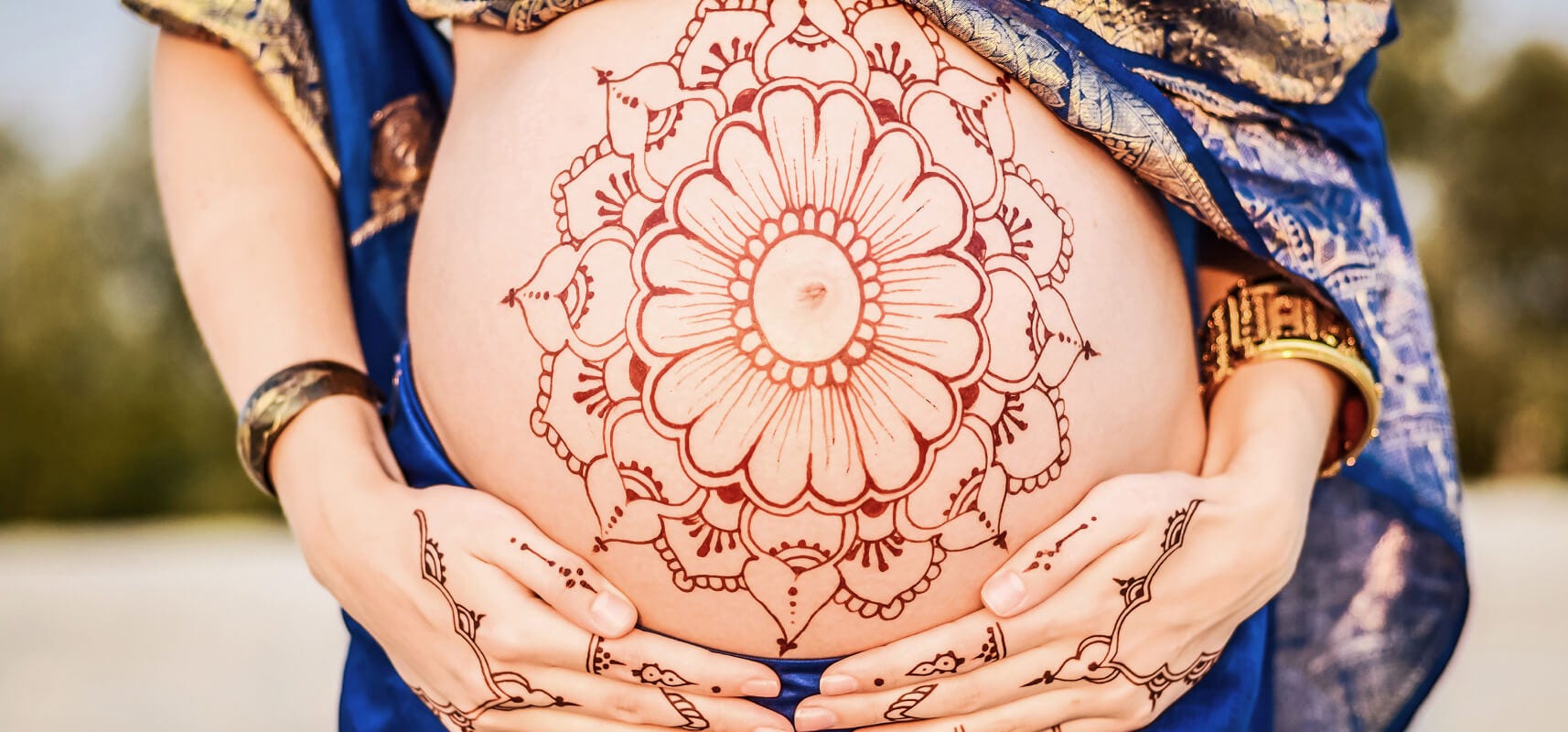

Henna is considered a safe, temporary alternative to a permanent tattoo during pregnancy. It’s a plant-based dye that stains the skin a brownish color, and each design can last as long as four weeks. Henna skin dyes have even been used in cultural pregnancy rituals (including decorating pregnant bellies) across the world for centuries. That said, if this is an option that appeals to you, there are a few things to keep in mind:
-
Ensure you’re getting actual, pure henna, mama! Natural (safe) henna does not come in the color black. Black henna is not safe for anyone, pregnant or not. Among other chemicals, black henna is made with Paraphenylenediamine (PPD), which can cause burns, blisters, and other bad reactions that can put your health at risk.
-
Consult with your doctor to ensure you aren’t allergic to natural henna and that it’s a safe option for you. While henna allergies aren’t very common, they aren’t unheard of, so it’s better to be safe than sorry.
Health Safety Note: Avoid Jagua and “Hengua” Tattoos
Jagua is a natural fruit-based product native to South America (and “hengua” tattoos are henna mixed with Jagua). Jagua has a blackish-blue color which can look closer to a traditional tattoo, making this option one that might appeal to some. However, it has not been studied extensively in clinical settings for reactions in the general population, which means even less is known about its potential negative effects during pregnancy.
Not only is it challenging to ensure you’re getting Jagua and not dangerous “black henna” (which, again, should be avoided even if you are not pregnant), but Jagua is known to cause skin reactions, including long-lasting hyperpigmentation at the application site for those whose skin develops a negative topical reaction. And while there isn't a lot of medical literature on Jagua, a key ingredient in Jagua called genipin has been found to cause allergic reactions in some individuals, making Jagua an overall less-than-appealing choice for pregnant mamas looking for a safe alternative to a permanent tattoo.
Decal or Press-On Tattoos
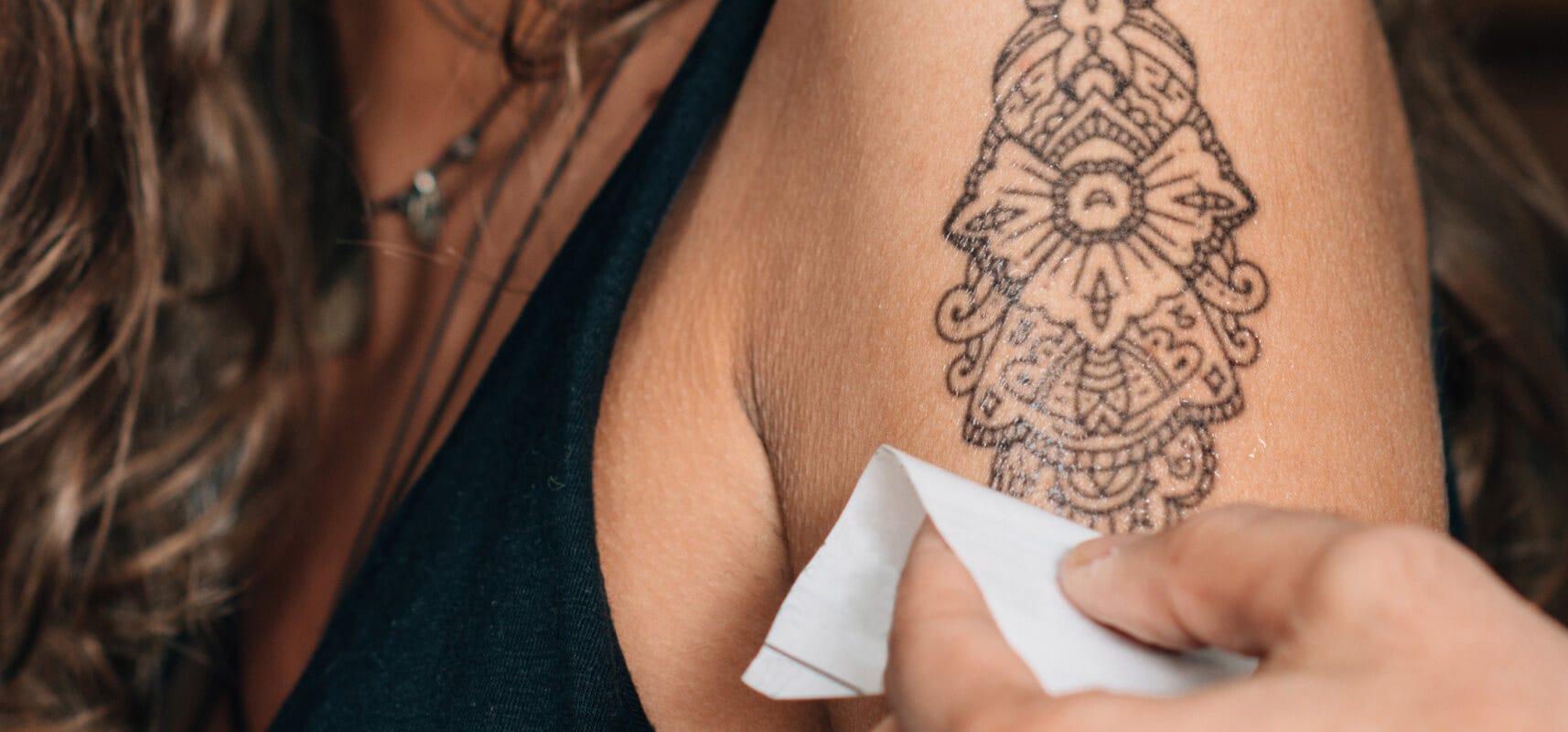

Temporary tattoos can be a fun way to add a little color to your skin while pregnant, particularly if henna isn’t your thing. Temporary water tattoos don’t enter the bloodstream, and reputable brands use FDA-approved color additives and non-toxic, cosmetic-grade ingredients.
As always, discuss this and any body art options with your doctor to ensure you choose the right option for yourself and your pregnancy.
Plan Your Post-Pregnancy Tattoo
If temporary tattoos aren’t your thing, you can plan and budget for the tattoo of your dreams while you’re pregnant instead! Use this time to:
-
Research artists and styles thoroughly.
-
Create a meaningful design that might even incorporate elements of your pregnancy journey or parenthood.
-
Save money so you can invest in a higher-quality piece.
-
Consider a placement that won't be affected by potential future pregnancies.
-
Plan for optimal timing after delivery and recovery.
This thoughtful planning period often results in an even more meaningful and well-executed tattoo that you'll treasure for years to come.
Timing Your Ink After Pregnancy
And when planning your post-pregnancy tattoo, keep these best practices in mind:
-
Wait until at least 6-12 months postpartum before you get a tattoo (particularly if you’re breastfeeding).
-
Allow your body to return to its pre-pregnancy state.
-
If you had a C-section and are choosing to tattoo over it, ensure the scar is fully healed before tattooing.
-
Wait until your energy levels are higher and you have the time, mental resources, and ability to care for a new tattoo.
-
Ensure you have made childcare arrangements during your appointment and initial healing period.
-
Give your body time until your post-pregnancy hormone levels normalize.
Your patience during this waiting period will be rewarded with a safer, more comfortable tattooing experience and optimal healing results.
The Ink Can Wait: Prioritizing Your Health and Your Baby’s Safety
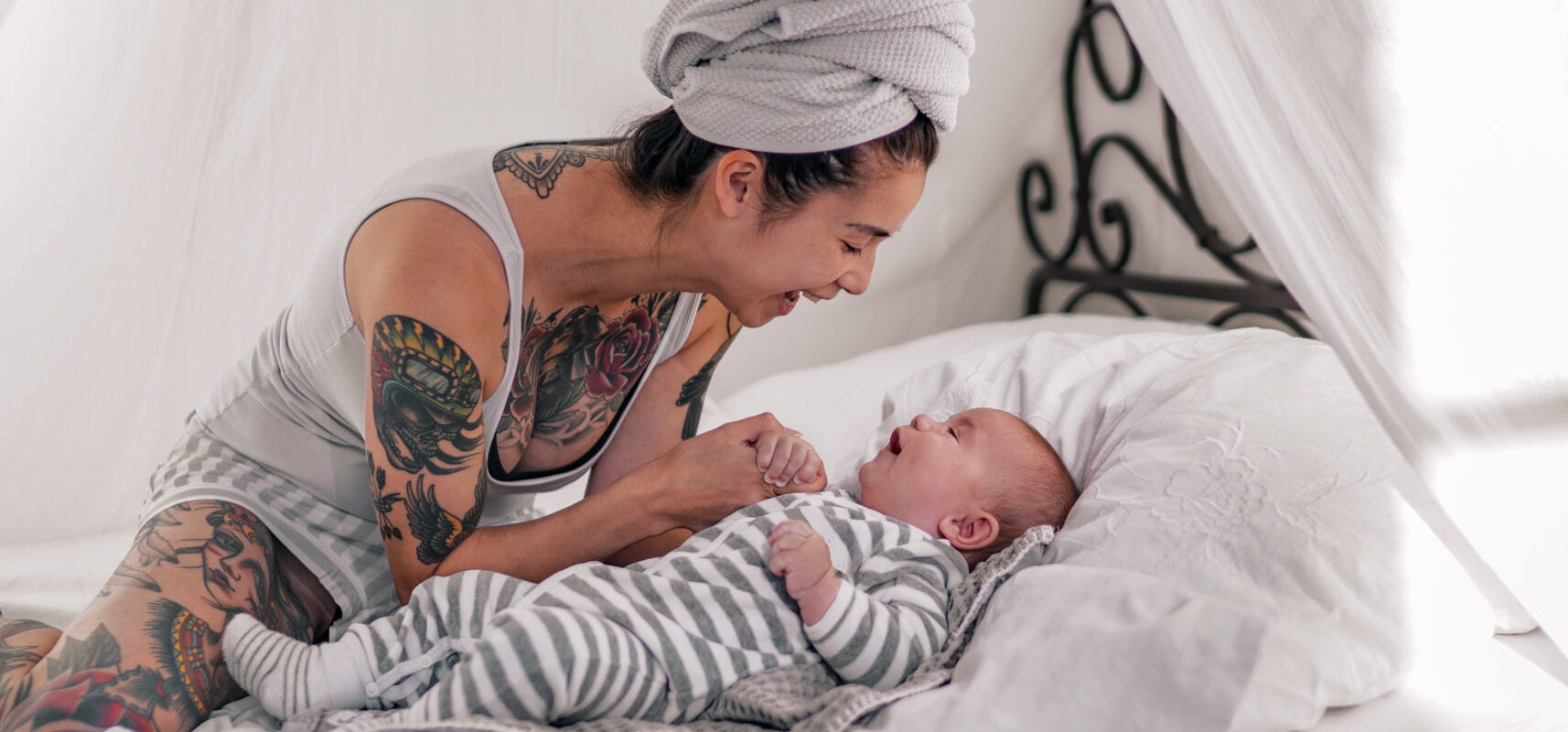

While we understand the desire to express yourself through body art during this special time, remember that temporary postponement isn't a "no"—it's just a "not yet." Your health and your baby's safety are the top priorities right now. If you're excited about getting a new tattoo, use this time to research artists, scout out the best tattoo parlor, perfect your design, and plan for a safer, more enjoyable post-pregnancy appointment.
And if you have any questions about other aspects of your pregnancy journey, don’t hesitate to reach out to your trusted healthcare professional. And remember: Our specialists are here to help too! You can call us at 844-867-9890 or contact us via chat. We're here to support you through pregnancy and beyond, mama!


